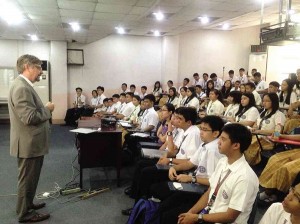Scott O’Neill, lead scientist of the Eliminate Dengue program, says the key to the reduction of dengue transmission may not be a vaccine for humans but a common bacterium, Wolbachia pipientis, that thrives in insect cells.
The dean of the Faculty of Science at Melbourne’s Monash University talked at the Philippine Science High School about the innovative method being developed to control dengue.
The talk was part of the Australian Embassy’s Scientists in School initiative, which aims to encourage students to take an interest in scientific research.
As he discussed the work they were doing, the scientist advised his audience: “Do not be afraid to work with big issues. If you want to do something that makes an impact, be prepared to persevere even in the face of failure.”
He said his team had thousands of failed trials but, after years of experimenting, they were able to infect enough mosquitoes with wolbachia. Results were even better than expected, he said.
O’Neill said previous studies showed that the bacterium was capable of halving the life-span of its carrier and infected nearly 70 percent of the insect population, though it was not usually found in most mosquito species.
Aside from shortening the life-span of a mosquito, the scientists found that the wolbachia also limited the dengue virus’ ability to replicate.
This information, he said, helped scientists of the Eliminate Dengue program to develop a different approach to the problem. They wanted to take the bacteria from infected fruit flies for micro-injecting into the eggs of a common dengue carrier, the yellow fever mosquito.
O’Neill explained it took eight to 10 days for a mosquito to transmit dengue after biting someone with the disease. The bacterium was expected to shorten significantly the insect’s normal life-span of 30 days, greatly reducing the chances of its passing on the dengue virus.
When tested in several outdoor cages in Australia, they found that generations of wolbachia-infected mosquito larvae could be produced so long as the female parent was infected.
From a small number initially, bacteria-infected mosquitoes multiplied to represent 95 percent of the population over a span of two years.
It was also noted that the mosquito population size was reduced by nearly 30 percent.
O’Neill said the program’s scientists were hopeful that the approach could also be used to control the transmission of chicken fever and malaria.
Further experiments will be carried out in Brazil, China, Vietnam and Indonesia in the following year.
O’Neill told his audience: “When I was your age, I knew I had an interest in science but I didn’t know what to do.”
He said that as he showed an interest in insects and human disease while studying for an agriculture degree, his mentor told him “to always be ambitious and not to be afraid to ask the big questions, which is why I do what I do today.”
O’Neill said: “When you’re working on the edge of knowledge, you can hope to predict what will happen but you don’t really know.”
